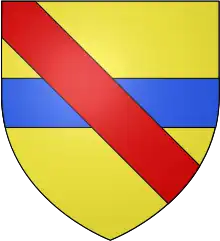Sir Gervase Elwes, 1st Baronet
Sir Gervase Elwes, 1st Baronet (bapt. 21 August 1628[2] – 11 April 1706) was an English Court Whig[3] politician who sat in the House of Commons at various times between 1677 and 1706.

Elwes was the son of Sir Gervase Elwes, of Woodford, Essex and his wife Frances, the daughter of Sir Robert Lee of Billesley, Warwickshire. He was baptised on 21 August 1628, at St Mary's Bothaw, London. He succeeded his father in April 1653, and at the Restoration was created a baronet on 22 June 1660.[4] [5]
In 1677, Elwes was elected Member of Parliament for Sudbury in a by-election to the Cavalier Parliament. He was elected MP for Suffolk in the first election of 1679 and for Sudbury again in the second election in 1679. He was re-elected MP for Sudbury in 1681. In 1690 he was elected MP for Suffolk again. He was elected MP for Sudbury again in 1700 and sat until 1706, and was sometime Lieutenant of the Tower of London.[4]
Marriage
He married Amy Trigge, daughter of physician William Trigge, of Highworth, Wiltshire.[3]
Sir Gervase Elwes died in April 1706 around the age of 77 and was buried at Stoke. (See Elwes baronets and Elwes for his descendants.) His grandson inherited the baronetcy.[1]
References
- Burke, John; Burke, Sir Bernard (1844). A Genealogical and Heraldic History of the Extinct and Dormant Baronetcies of England, Ireland, and Scotland. John Russell Smith. p. 182. Retrieved 21 July 2017.
- Phillimore, William Phillimore Watts (1892). The London & Middlesex Notebook: A Garner of Local History and Antiquities. Elliot Stock. p. 108. Retrieved 17 June 2017.
- Henning, B. D., ed. (1983). "ELWES, Sir Gervase, 1st Bt. (1628-1706), of Stoke College, Stoke by Clare, Suff.". The House of Commons 1660-1690. The History of Parliament Trust. Retrieved 26 November 2022.
- George Edward Cokayne profile Complete Baronetage (vol. 3; 1900)
- "Charles II - volume 1: May 29-31, 1660 Pages 1-16 Calendar of State Papers Domestic: Charles II, 1660-1. Originally published by Her Majesty's Stationery Office, London, 1860". British History Online. Retrieved 13 July 2020.